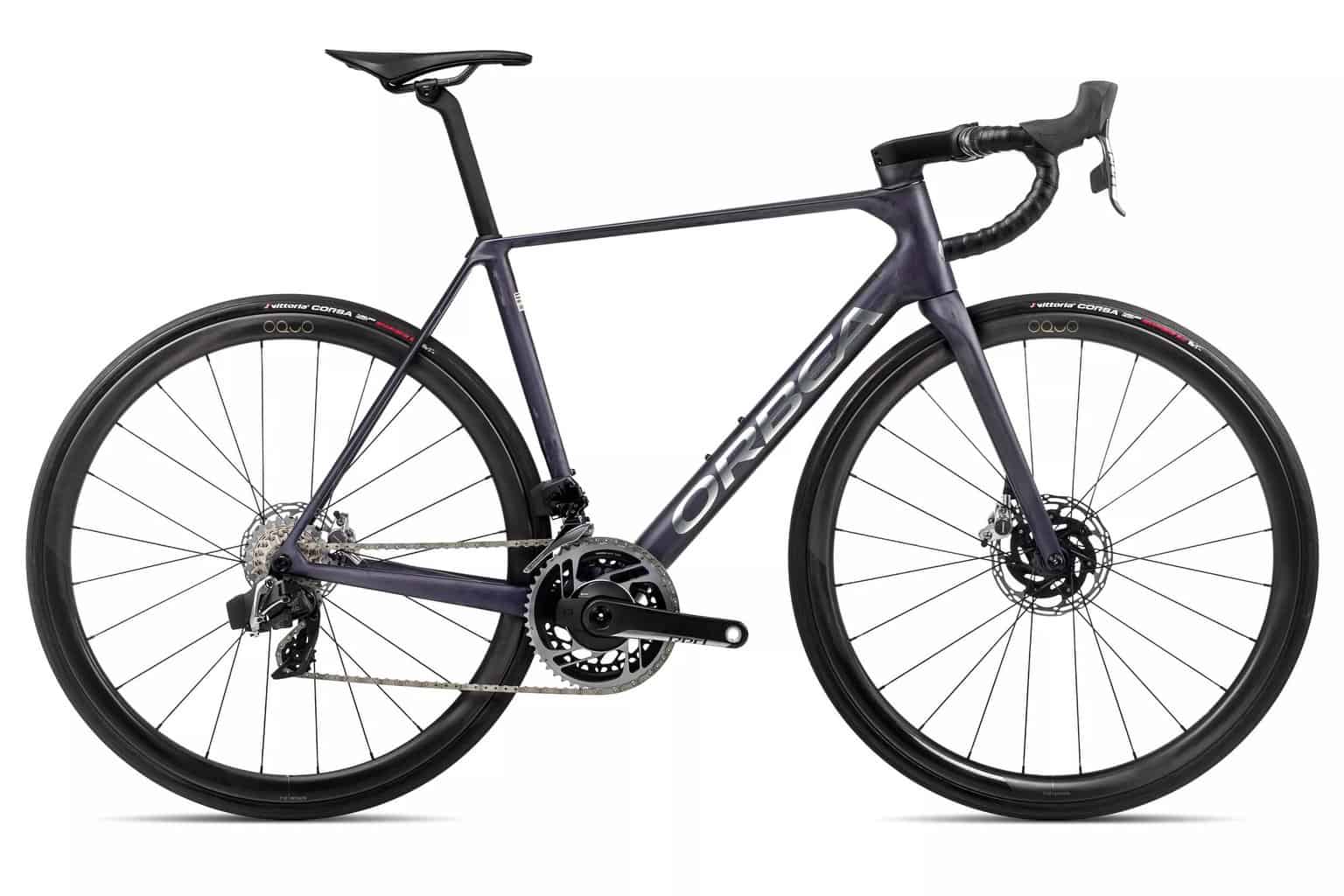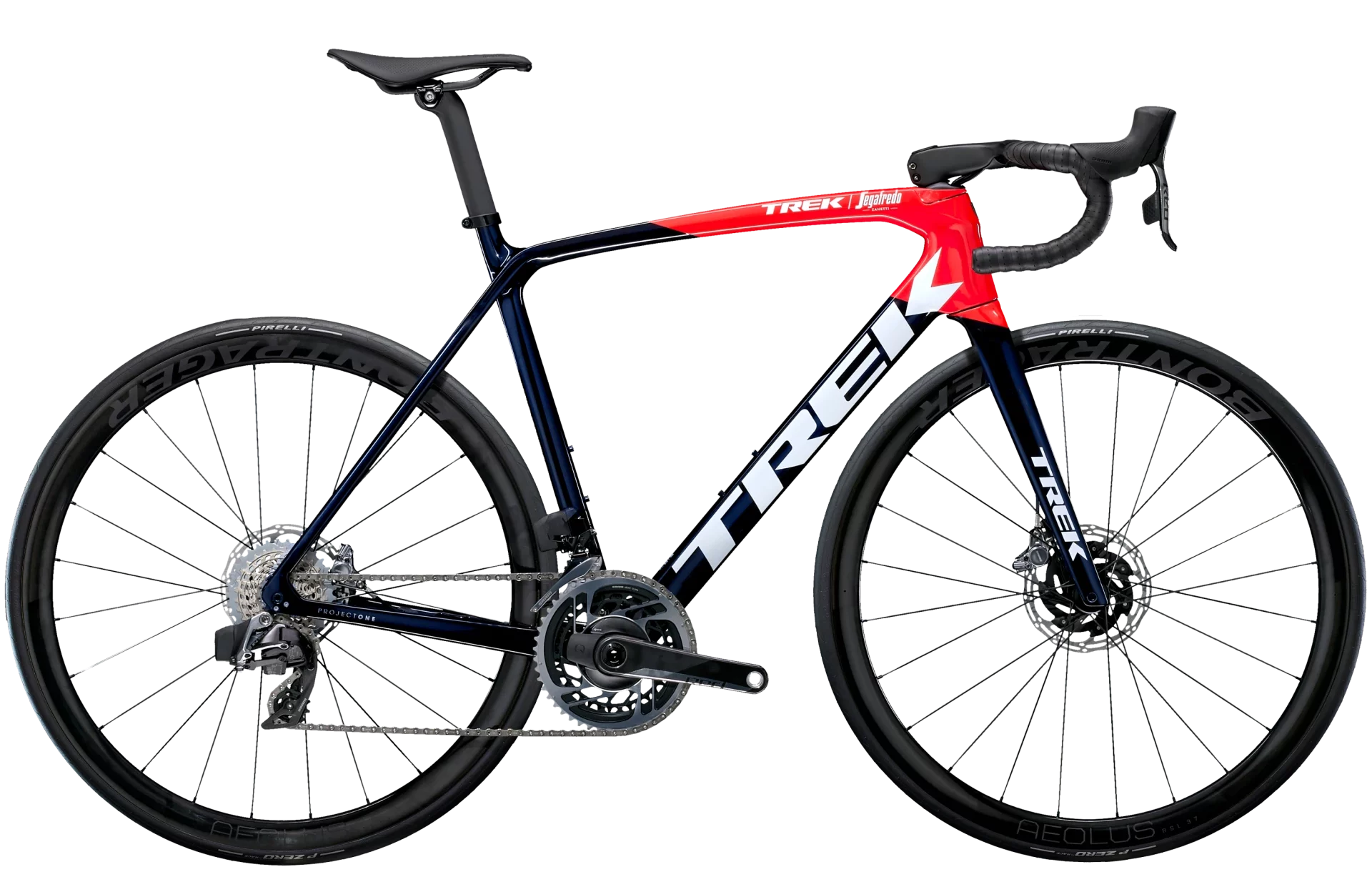In this article, I’ll guide you through a comparison between the Orbea Orca and Trek Emonda; both popular road bikes among cyclists.
I’ll walk through the Orbea Orca and Trek Emonda models lineup, their specifications, and retail pricing (USD). I’ll explain the carbon fiber technology used (Orbea Monocoque (TorayCa) Carbon vs Trek OCLV), and unique frameset features for each bike.
The goal is to help you get a better understanding before you make your final purchasing decision.
| Orbea Orca | Trek Emonda | |
|---|---|---|
| Type of bike | Lightweight, all-rounder | All-rounder |
| Frame material | OMX (T1100) carbon OMR (T800) carbon | OCLV 800 carbon OCLV 500 carbon |
| Frame sizes | 47, 49, 51, 53, 55, 57, 60 | 47, 50, 52, 54, 56, 58, 60, 62 |
| Groupset | Shimano, SRAM (12-speed) | Shimano, SRAM (12-speed) |
| Brakes | Hydraulic disc | Hydraulic disc |
| Cabling | Internal | Internal |
| Price (USD) | $3,599 to $11,599 | $4,999 to $13,199 |
Orbea Orca

The latest Orbea Orca was launched in mid-July 2023, during the last week of the Tour de France.
Compared to its predecessor, the 2024 Orbea Orca is a lot lighter (832g previously vs 750g for a size 53 frame). This is achieved using a traditional-looking, round tube frame without the dropped seat stays seen on the majority of road bikes today. At 6.7kg for the top-of-the-line M11eLTD PWR model with SRAM Red AXS, it’s among the lightest, disc brake road bikes available today, alongside the likes of Cannondale Supersix Evo LAB71 and Cervelo R5.
Like many other Orbea models, the Orbea Orca offers a lot of customization options for the riders, thanks to the MyO configurator. There are 11 models available with either Shimano or SRAM electronic shifting groupsets. The models with PWR indicate it comes with a power meter, the LTD models use the highest grade OMX carbon.
| Model | Frame material | Groupset | Wheelset | Retail price (USD) |
|---|---|---|---|---|
| Orbea Orca M11eLTD PWR | OMX (Toray T1100) carbon | SRAM Red eTap AXS | Oquo RP35LTD (carbon) | $11,599 |
| Orbea Orca M10iLTD PWR | OMX (Toray T1100) carbon | Shimano Dura-Ace Di2 (R9200) | Oquo RP35LTD (carbon) | $11,599 |
| Orbea Orca M21eLTD PWR | OMX (Toray T1100) carbon | SRAM Force eTap AXS | Oquo RP35LTD (carbon) | $7,999 |
| Orbea Orca M20iLTD | OMX (Toray T1100) carbon | Shimano Ultegra Di2 (R8100) | Oquo RP45LTD (carbon) | $6,999 |
| Orbea Orca M31eLTD | OMX (Toray T1100) carbon | SRAM Rival eTap AXS | Oquo RP45LTD (carbon) | $5,999 |
| Orbea Orca M31iLTD PWR | OMX (Toray T1100) carbon | Shimano 105 Di2 (R7100) | Oquo RP45LTD (carbon) | $5,999 |
| Orbea Orca M21eTEAM PWR | OMR (Toray T800) carbon | SRAM Force eTap AXS | Oquo RP35TEAM (carbon) | $6,899 |
| Orbea Orca M21iTEAM | OMR (Toray T800) carbon | Shimano Ultegra Di2 (R8100) | Oquo RP35TEAM (carbon) | $5,999 |
| Orbea Orca M31eTEAM | OMR (Toray T800) carbon | SRAM Rival eTap AXS | Oquo RP35PRO (alloy) | $4,699 |
| Orbea Orca M35i | OMR (Toray T800) carbon | Shimano 105 Di2 (R7100) | Oquo RP35TEAM (carbon) | $4,599 |
| Orbea Orca M30i | OMR (Toray T800) carbon | Shimano 105 Di2 (R7100) | Oquo RP35PRO (alloy) | $3,599 |
Orbea Orca vs others
Trek Emonda

The Trek Emonda is a lightweight bike for the high mountains.
The lightest Trek Emonda frame weighs less than 700g using Trek’s OCLV 800 carbon. This is the bike Richie Porte rode to his third place in the 2020 Tour de France.
The SLR is the lightest and most expensive atop the Trek Emonda models. There are six Emonda SLR options, specced electronic shifting groupsets from SRAM or Shimano.
Next in line is the SL, the mid-range, more budget-friendly option. It has the same frame design and geometry as the SLR but uses the OCLV 500 carbon instead. The groupset choices are Shimano Ultegra Di2, Shimano 105 Di2, SRAM Force AXS, or SRAM Rival AXS.
The Trek Emonda SLR and SL framesets are also available separately.
| Model | Frame material | Groupset | Wheelset | Retail price (USD) |
|---|---|---|---|---|
| Trek Emonda SLR 9 AXS | OCLV 800 carbon | SRAM Red eTap AXS | Bontrager Aeolus RSL 37 | $13,199 |
| Trek Emonda SLR 9 | OCLV 800 carbon | Shimano Dura-Ace Di2 (R9200) | Bontrager Aeolus RSL 37 | $12,749 |
| Trek Emonda SLR 7 AXS | OCLV 800 carbon | SRAM Force eTap AXS | Bontrager Aeolus Pro 37 | $9,699 |
| Trek Emonda SLR 7 | OCLV 800 carbon | Shimano Ultegra Di2 (R8100) | Bontrager Aeolus Pro 37 | $8,999 |
| Trek Emonda SLR 6 AXS | OCLV 800 carbon | SRAM Rival eTap AXS | Bontrager Aeolus Pro 37 | $8,399 |
| Trek Emonda SLR 6 | OCLV 800 carbon | Shimano 105 Di2 (R7100) | Bontrager Aeolus Pro 37 | $7,699 |
| Trek Emonda SL 7 AXS | OCLV 500 carbon | SRAM Force eTap AXS | Bontrager Aeolus Pro 37 | $6,699 |
| Trek Emonda SL 6 | OCLV 500 carbon | Shimano 105 Di2 (R7100) | Bontrager Aeolus Elite 35 | $4,999 |
Trek Emonda vs others
Orbea vs Trek carbon fiber
Orbea Monocoque (TorayCa) Carbon
Orbea uses carbon fiber from TorayCa in their bikes. It’s one of the handful of bike manufacturers that uses a monocoque carbon fiber construction, resulting in a lighter and stiffer frameset. The two most prominent types of carbon used in Orbea’s bike frames are OMX (T1100K) and OMR (T800) carbon.
- OMX (Orbea Monocoque X) carbon is Orbea’s top-grade carbon fiber, with the ultimate blend of stiffness, lightness, and strength. Monocoque refers to a type of construction technique where the external skin supports the structural load, which, when applied to bike frames, results in a balance of strength and weight. Due to its high manufacturing cost, OMX carbon is typically reserved for Orbea’s top-tier models.
- OMR (Orbea Monocoque Race) is the standard carbon composite used by Orbea. While OMR doesn’t match the absolute performance capabilities of OMX, it offers a fantastic performance-to-value ratio. This makes it a great choice for riders looking for top-notch performance without the premium price tag of the top-grade OMX carbon.
Trek OCLV carbon
The OCLV (Optimum Compaction, Low Void) carbon is a proprietary carbon fiber manufacturing technology developed by Trek.
- Optimum Compaction refers to the heat and pressure applied during the curing process to squeeze out excess resin and ensure that the carbon layers are compacted to the optimal density.
- Low Void refers to the goal of reducing microscopic air pockets or voids that can occur in the carbon fiber and create weaknesses.
One of the key advantages of OCLV carbon is its ability to achieve an optimal balance between stiffness, strength, and weight. Trek engineers carefully tune the carbon layup and utilize varying modulus carbon fibers to create stiff frames in certain areas to maximize power transfer while maintaining compliance in other areas to enhance comfort and ride quality.
The OCLV carbon is available in 800 and 500 series.
- OCLV 800 is the highest-grade carbon fiber used by Trek. The carbon modulus is higher in OCLV 800, making it stiffer and lighter. The manufacturing process is more refined, using more advanced carbon and resins, leading to a bike frame that provides top performance levels for stiffness, weight, and strength. OCLV 800 is used in all models with SLR.
- OCLV 500 is a lower-grade carbon but still offers a high level of performance. It has a slightly lower carbon modulus, meaning it’s a bit less stiff and heavier than OCLV 800. OCLV 800 is used in all models with SL.
It’s worth noting that the different OCLV grades don’t only refer to the material itself, but also to the manufacturing techniques used to form the carbon fiber into bike frames. Higher-grade carbon requires more precise manufacturing techniques to take full advantage of its superior material properties.
Frameset technologies and innovations
Orbea Orca and Trek Emonda framesets incorporate advanced technologies to enhance their bikes’ performance and ride characteristics.
Here’s an overview of the technologies used in each bike model.
Orbea Orca
| Name | Description |
|---|---|
| Monocoque Carbon Construction | Monocoque carbon construction is a process that uses the most advanced carbon technology to create the most sophisticated bike frames possible. Monocoque means that the frame is made of a single piece of carbon fiber, rather than multiple pieces joined together. This ensures that the frame is lighter, stiffer, and stronger, as there are no weak points or excess material. Orbea has two grades of carbon fibers; OMX (Orbea Monocoque X-Light) and OMR (Orbea Monocoque Race). Orbea also uses a bladder molding technique with EPS (expanded polystyrene) forms and PU (polyurethane) inserts to prevent wrinkles and gaps in the carbon layers, which can compromise the quality and durability of the frame. |
| ICR Plus | This stands for Internal Cable Routing, which is a system that routes all the cables neatly through the bar, stem, and headset for a clean look and improved aerodynamics. ICR also makes it easier to maintain and service the bike compare to other bike brands’ solutions. |
| Powerspine | Powerspine is a frame design technology that enhances the stiffness and power transmission of the bike. The Powerspine is the lower spine of the frame that handles the large majority of torsional and lateral loads. This means that the frame is stiff in the right places, which results in direct power transfer to the rear wheel and more efficient pedaling. The Powerspine also contributes to the lightness and aerodynamics of the Orca, as it eliminates unnecessary material and reduces drag. |
Trek Emonda
| Name | Description |
|---|---|
| OCLV Carbon | Optimum Compaction, Low Void (OCLV). A carbon fiber technology used in Trek frames. Employs advanced layup techniques and precise carbon compaction to create lightweight, strong frames with a balanced blend of stiffness and compliance. Available in two grades; OCLV 800 and 500. A higher number indicates a higher grade carbon. |
| H1.5 geometry | Trek’s geometry design that strikes a balance between aggressive racing positioning (H1) and rider comfort (H2). H1.5 geometry provides a slightly more relaxed riding position than the racier H1 geometry, making it suitable for a wider range of riders. |
| Project One | Trek’s customization program allows riders to create personalized and unique bikes. With Project One, riders can customize various aspects of their bikes, including frame color, paint scheme, components, drivetrain, wheels, and other details. |
Where to buy
Orbea retailers
- Orbea retailers. Use this tool to find your nearest Orbea dealers.
Trek shops
- Trek online shops. Australia, Austria, Canada, Germany, Netherlands, United Kingdom, United States
- Trek retailers. Use this tool to find your nearest Trek retailers.

Bernard Lu has 7+ years of experience working in a bicycle shop, overseeing the retail and workshop operations. He’s a qualified bicycle mechanic who understands a cyclist’s needs and speaks the same cycling lingo.
If you meet him at the cafe, he will happily talk to you for hours about all the intricacies of bikes and cycling tech. Just buy him a coffee next time you see him.